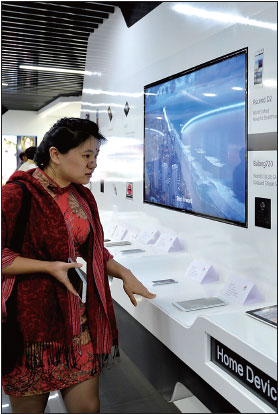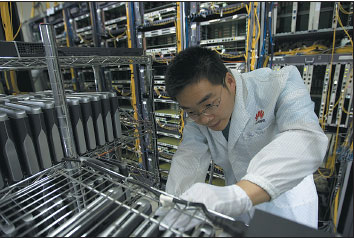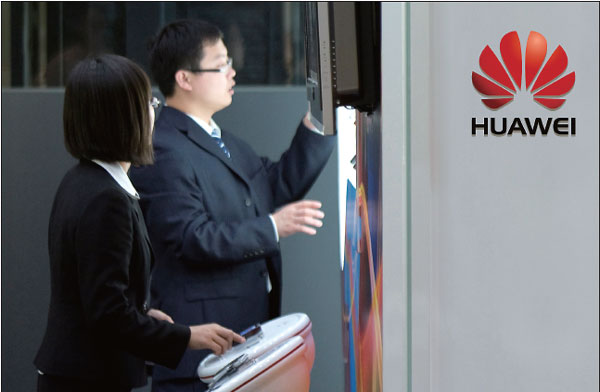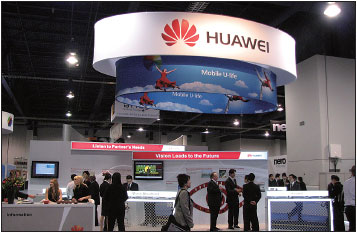Leading the way to ultra-broadband
New strategy aims to upgrade online content and services, to build a connected, intelligent society, Zhuan Ti reports.
Chinese telecommunications company Huawei Technologies Co Ltd released its first video strategy, called VideoSense, recently at the fourth Ultra-Broadband Forum in Frankfurt, Germany.
The strategy involves upgraded broadband, video quality and content. It centers on the expansion and extension of China's ultra-broadband network, as well as the greater monetization of improved video services.
|
With more than 5,000 engineers, Huawei's Research and Development Center in Bangalore is its largest overseas R&D center.Xinhua |
Huawei Network Product Line Vice-President He Yibo said that Huawei's VideoSense strategy will help operators transform their core business from simply providing channels, to driving and improving user experience.
Moving from passive operation to active management, the strategy will help enhance operators' competitiveness in various markets, he said.
Focused on the active management of video experience, the VideoSense strategy represents Huawei's paradigm shift for video services, networks and service maintenance.
Recently, the three major Chinese telecommunications operators, China Telecom Corp Ltd, China Mobile Ltd and China United Network Communications Group Co Ltd, came to a consensus regarding the full coverage of household optical fibers, in order to provide wider coverage of ultra-broadband.
Ding Yun, Huawei's executive director, said that people need ultra-broadband far more than operators can currently imagine and it will become a key building block in creating an intelligently connected society.
"We believe that the ultrabroadband network will ultimately contribute to the success of our global clients.
"Through the collaborate efforts of all parties, we will work together to build up a healthy and sustainable new normal in the ultra-broadband industry," Ding said.
Ultra-broadband refers to gigaband connectivity, meaning that communication technology can reach data transmission speeds of at least one gigabyte per second.
One of Huawei's focuses is generating greater revenue from broadband, aiming to transform broadband users into video users as customers are more willing to pay for video services.
By binding video content to the broadband service and binding broadband to mobile facilities, the value is transferred to the traditional payment channel, boosting revenues.
|
A R&D technician maintains tech facilities at a lab in Huawei.Xinhua |
The major telecommunications companies agreed to ensure the full coverage of video services, in order to drive improved mobile wideband revenues and broadband services.
Huawei's rotating CEO Xu Zhijun said at the forum that video services, especially 4K and cloud services, give added impetus to ultra-broadband.
He added that operators should consider video business, especially 4K video, as their basic business alongside their telecommunications service.
In 2005-08, most Chinese operators saw video as an added revenue stream, largely delivered via internet streaming, known as IPTV.
But their experiences since then have varied wildly, said Xu.
Nowadays, there are 140 IPTV operators around the world, excluding China. Only 26 of them have more than half of their users adopting IPTV broadband.
Xu said that the successful operators are those that have adjusted their video business into a strategic service, rather than it only being a value-added business.
Huawei's strategy also focuses on monetizing video services. As users' demands increase, they become more willing to pay more for a better video experience.
For instance, a number of operators currently offer 4K service, content recommendation and video calls, which have exemplified the revenue-enhancing model.
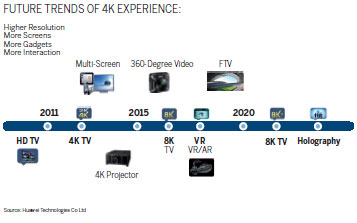
The essence of the model is user experience. Operators are looking to build up their own video platform and provide the best experience with tailored video content.
In addition, the strategy looks to encourage operators to break the scope of their own video business, by opening up to other industries through various supply channels.
The core of this model is opening-up operators' video services to all potential opportunities, such as security, intelligent cities, remote medical services, advertising and so on.
Partnership
President of Global Marketing and Solution Sales Wang Shengqing said that Huawei has generated this multifaceted model based on the qualities and successful practice of those operators developing their video businesses.
He added that Huawei will fully support the operation of these businesses in accordance with the model and help them to succeed.
Themed "UBB2020, embrace a better-connected world", this year's Ultra-Broadband Forum was organized by the United Nations Broadband Commission and Huawei.
It is a platform for discussion regarding the ultra-broadband industry, video business and cloud service among 600 futurists, business leaders and technology pioneers that span a variety of industries.
|
Huawei Technologies Co Ltd views broadband-based video services as the core for its future strategy.Xinhua |
|
Foreign visitors are attracted by Huawei's products at a tech expo.Xinhua |
|
Huawei releases its first tablet laptops in Barcelona, Spain.Xinhua |
(China Daily 11/25/2016 page3)
